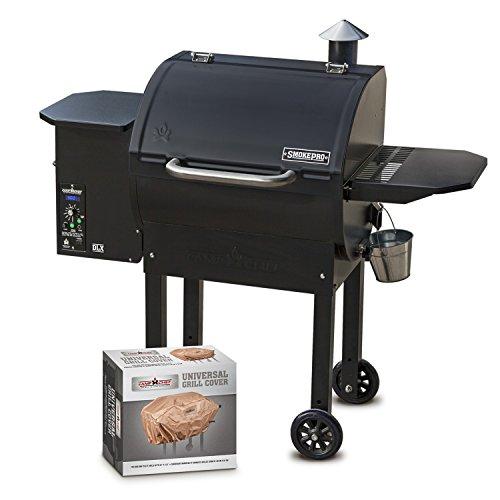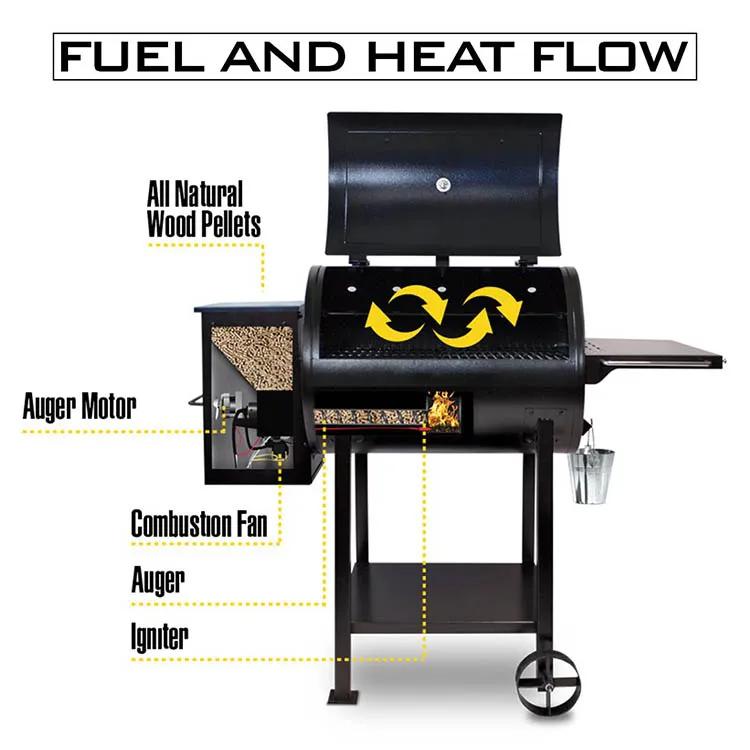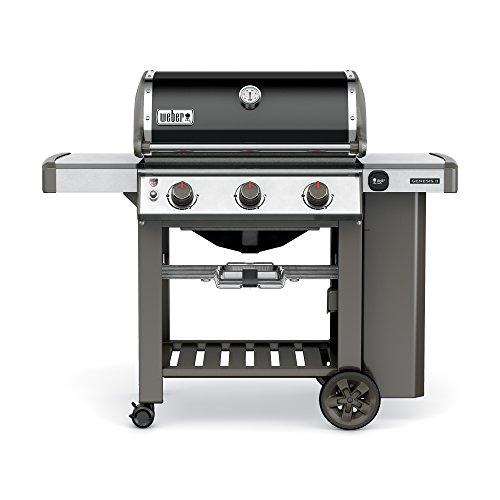Back in the day, buying a grill was a fairly straightforward task. Perhaps you had the choice of a few brands, and the big question was which brand offered the best quality within the constraints of your budget.
These days, there is a vast range of grills available. And if you are after a versatile grill that is easy to use, the choice comes down to a pellet or gas grill.
But there are still differences between these two types of grill that will affect your decision. Do you want a grill that excels at smoking low and slow? Or are you more likely to want a grill that will leave you with great sear marks on your steak?
Let’s have a closer look at pellet and gas grills and the pros and cons of each type of grill.
Pellet Grill vs Gas Grill Overview
Before you decide what grill is right for you, let’s explain a few key differences. While they bot have the word “grill” in the title, they are actually quite different cookers.
Both pellet and gas cookers offer speed and convenience in a very user-friendly package.
Pellet grills make great “set and forget” versatile cookers. they’re more of like an outdoor oven. They do a great job at cooking low and slow. They will also impart a subtle smokey flavor to your food.
You may have heard people talk about pellet smokers and pellet grills. They just different ways to refer to the same thing. In fact, pellet smokers might be a better name, as they make much better smokers than grills.
Pellet grills generally cost more than gas grills, and pellets are not as readily available as gas.
So if speed, cost effectiveness and great sear marks on your steak mean more to you, you may want to take a closer look at gas.
Gas grills really come into their own when cooking at mid-high range temperatures. You can generally find a gas grill to fit your budget, and gas is an efficient fuel to burn. A gas grill will also heat up lightning fast.
All that being said, gas grills don’t perform as well as pellet grills at lower temperatures. The insulation isn’t great which makes it difficult to smoke on gas grill.
Pellet Grill Overview

Calling these cookers a grill is a bit confusing. It is best if you view it as a smoker / outdoor oven that can also grill.
As pellet grills become more popular, the pool of manufacturers offering these cookers is growing. Among barbecue enthusiasts, Rec-Tec, MAK, Yoder, and Traeger are all brands that come highly recommended.
Pellet grills use indirect heat to cook food, with the help of a convection fan, somewhat like an oven. To power the fan, and other features of the grill, pellet grills need to be plugged in to your electricity.
This diagram from Pit Boss shows how Pellet grills work.

Wood pellets for smoking are made from compressed sawdust shaped into cylinders much like large chicken feed pellets. These are placed into a large container known as the hopper. It is usually situated at the side or at the back of the unit.
The hopper is shaped like a funnel at the bottom, and feeds the pellets into the auger. The auger looks like a large screw, which slowly turns and feeds the pellets into the firepot.
The firepot has a rod inside, which heats up to be glowing red. When the pellets come in contact with this rod, they catch fire, and produce the smoke and heat which cooks your food.
The fan blows this smoke and heat throughout the cooking area of the grill. Many pellet smokers will also have a heat baffle to distribute the heat evenly throughout the cooking area.
Advantages of the Pellet Grills:
- Supremely convenient – Once you have filled up the hopper with pellets, and set the temperature, all you need to do is kick back, relax and wait for your dinner.
- Fuel efficient, cheap to run – Pellet grills have a convection fan, meaning they run very efficiently. This means you can expect to spend less on pellets than you would on charcoal.
- Easy to maintain – Unlike charcoal grills, pellet grills don’t make much of a mess. Aside from the cooking surfaces themselves, you may need to clean out the firepot occasionally, but that is it.
- Versatile – Pellet grills allow you to smoke, roast, bake, barbecue, and grill (although the sear won’t be as good as you can expect from a charcoal grill) all within one unit.
- Quick – You can expect your pellet grill to be up to temperature and ready to cook within 15 minutes.
Disadvantages of Pellet Grills:
- They need to be plugged in – Pellet grills are not as portable as other types of griller. They aren’t suitable for camping unless you have a generator.
- Not the cheapest option to buy – To get a quality pellet grill, you need to be prepared to outlay some cash. Be prepared to pay at least $400.
- Emergency pellet stockpile is a must – Smoking pellets are more of a specialty item. While you can head down the road and grab more coal easily enough, this is not necessarily possible with pellets, unless you’re lucky enough to have a specialty barbecue store nearby. Getting the pellets you like may well involve an order from Amazon.
- Less smoke and less heat – Pellet burners do not produce a strong smokey flavor like stick burners, for example. As we mentioned earlier, they also do not reach the same high temperatures as other types of grills, so you cannot expect great sear marks either. Some models like the Camp Chef PG24 Deluxe let you get around this by purchasing a sear grill attachment.
Gas Grill Overview

Gas grills are best suited to grilling at high temperatures for shorter periods of time. However, some grills come with lids and other features which allow them to be used for indirect cooking as well.
Gas grills will use either propane or natural gas, but which type you should use is a subject for another post! To be clear, we will talk about LPG grills in this post seeing they are more commonly used.
The gas is stored in a gas bottle which usually sits under the cooking area of the barbecue.
The gas travels up through the gas regulator hose into to the manifold. The manifold is a tube that runs along the length of the cooking area.
The manifold then feeds the gas into valves. These valves are what you use to control the amount of gas you wish to burn, which in turn, controls the temperature.
Some gas grills will have an infrared burner, which distributes the heat evenly. However, most gas grills will have burners that produce a flame. Food isn’t cooked directly over the flame, so that heat needs to be distributed evenly throughout the grill.
One way to do this is by using briquettes. These sit directly on top of the flame on a rack. The flame heats the briquettes. Your food sits on a rack on top of these briquettes, and the heat is evenly distributed to cook your food.
We have a full guide for how to smoke on a gas grill.
Advantages of the Gas Grill:
- Great for grilling – Kind of obvious advantage. Gas grills really come into their own when grilling at higher temperatures. While they can be used as smokers, they will not do as well as other types of barbecue when cooking low and slow.
- Cheap – You can find a gas grill that suits just about any budget. While the higher-end gas grills will obviously offer more features, there are still quality offerings at the lower end of the price range. Gas is also a cheap, efficient, and readily available fuel. You can hope to get around 20 hours of grilling time out of a typical LPG tank.
- Ease of use – As long as your gas bottle is full, once you have got the temperature right on your gas cooker, your barbecue should be done with a minimum of fiddling and fuss.
- Speed – Gas grills should only take around 10 minutes to reach the desired cooking temperature.
- Clean – Gas is a clean-burning fuel, so you will not be left to clean up the remains of burnt wood or coals.
Disadvantages of Gas Grills:
- Heat retention – Gas grills need good ventilation. For this reason, the heat retention of gas grills is not great. This makes them poor smokers.
- Lack of flavor – Gas itself is flavorless, so you are not going to get any smoke flavor into your food when using gas as fuel without the addition of a pellet smoking tube or something similar.
- Safety considerations – You will need open space to operate a gas grill. This is to reduce the fire hazards posed when using gas. Also take a moment to check your local rules and regulations, as some city ordinances prohibit the use of gas grills.
- Temperature control can be fiddly to start with – Once you are familiar with your gas grill, the temperature shouldn’t be a problem. However initially, you might need to fiddle around with the controls to make sure you are getting the heat just right.
Pellet Grills and Gas Grills Go Head to Head
Now that you understand the main differences between these types of cookers, let’s look at how they compare across a few key areas.
Ease of Use
Both gas grills and pellets grills are popular largely due their ease of use. Considering that the trickiest part of grilling is getting the fire going, it stands to reason the appealing feature of both of these types of grills is that starting the fire is as easy as turning a knob.
Both are also easy to clean up.
If you plan on using your cooker as an oven or smoker, then this is easier on a pellet grill. While you can hack a gas grill into a decent smoker, it takes a little bit more DIY skills.
Temperature Control and Range
Pellet grills excel when cooking low and slow, with the sweet spot being between 200-350°F. They struggle at temperatures of 400°F plus, and generally will not reach anything above 450°F.
On the other hand, you have pretty much the opposite situation with gas grills. Most gas grills will have no problem hitting the 500°F mark. Better quality gas grills will be capable of reaching temperatures around 700°F,
However, the heat retention issues often associated with gas grills means that controlling the temperatures in the lower ranges can be difficult. Cheaper gas grills which have poor heat retention may struggle to maintain a consistent temperature around 250°F.
That being said, a good quality gas grill will do a better job of keeping consistent low temperatures.
Pellet grills work with complex algorithms which control the temperature, and some models can even offer accuracy of +/- 5°F, which is pretty impressive.
Fancy Features
Both gas and pellet grills offer fancy bells and whistles, especially as the price gets higher. But at this point pellet grills are more likely to come packed with technology.
Pellet grills are, by design, high tech units. As such, manufacturers have been quick to include features such as WiFi and Bluetooth capability, integrated meat probes and LCD screens. Some can even be programmed to hold meat at a certain temperature once the cook is done.
Gas grills don’t come with automated temperature control features. Usually, gas grills come with more traditional features, such as side burners and rotisseries. Some models also offer little luxuries like internal lights and illuminated knobs.
Are Pellet Grills Healthier?
Potentially carcinogenic compounds are formed when muscle meats are cooked at high temperatures. These compounds have also been identified in the smoke from charcoal or wood.
There have been some claims pellet grills are a safer barbecuing option.The claim is that pellet grillers by design do not allow as much of this potentially dangerous smoke to come into contact with the food. The fact that pellet grills don’t reach the same temperatures that other grillers do has also given rise to the idea that it is a safer barbecuing option.
However, for these claims to be verified a lot more in depth research needs to take place. In fact, Kristie Sullivan, a toxicologist at the Physicians Committee for Responsible Medicine relates that these carcinogenic compounds can still be produced without visible char marks on the meat.
If you would like to know more about this topic you can find a helpful article here.
Wrapping it up
We hope you have enjoyed our comparison of pellet and gas grills.
If you are about to lay down a wad of cash to buy a new grill, you no doubt a grill that offers the best value for money, and is most suited to your needs.
And while both pellet and gas grills offer a great level of convenience and efficiency, there are differences that will determine which one comes out on top for you.
Do you have a pellet or a gas grill? How do you find it? Have you got any tips, tricks or questions? Make sure you leave them in the comments section below.